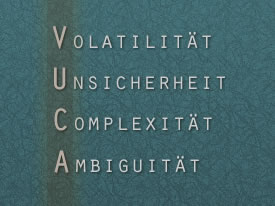3. December 2014
 Two days on leadership, VUCA, personal development, work-life balance
Two days on leadership, VUCA, personal development, work-life balance
Donning a blue cape to walk along a fictional catwalk and saying who you are is not quite the behaviour one would expect of managers. This scene took place among the participants of a special SYNNECTA event format: a »LeadershipJourney«.
The »LeadershipJourney« is a special, tailored SYNNECTA format. In July 2014, we took sixteen managers from a large German organization along with us on a two-day journey. The stations of the journey were as unusual and unexpected as the everyday life of leadership is in a global business world. The journey was our opportunity to experience the challenges of our own life in management from a completely new point of view. We focussed on perceiving the external and internal landscapes that managers take action within. The managers asked elementary questions
- Which global conditions do I face in my daily work?
- How do I approach them and how do I feel about that?
- How do I solve crises? Who or what gives me strength?
- What does that mean to me as a role model in my organization?
The apparent dividing line between the worlds of work and life became increasingly blurred in the course of the journey, realigning the axes of inside (my life) and outside (my work) into centres of one’s own life before long. These centres impact each other; they cannot be lived apart.
The journey first brought us to Ehreshoven in Germany’s Bergisches Land region, where we were housed in the Order of Malta Conference Centre Malteser Kommende and addressed several topics: the world of VUCA, the Order of Malta’s millennium-long history and their approach to uncertainty, our own management style and self-leadership.
VUCA describes the conditions and challenges of the present-day world: Volatility, Uncertainty, Complexity, Ambiguity. VUCA develops within global and external conditions that lie beyond an individual’s sphere of influence. However, we as persons can shape our own environment in which VUCA reveals itself. We can make VUCA »endurable«, we can reap the benefits. In the end, we arrived at the key recognition of the fact that we are not called upon to fight the world of VUCA; instead, the managers found ways of using its energy. We had found a conciliatory outlook into turbulent times.
The museum of ethnology Rautenstrauch Joest Museum in Cologne allowed us to discover the variegated cultural phenomena of the world. Together with all participants, we addressed amongst others the question how other cultures deal with VUCA. We were given valuable input by Dr. Clara Himmelheber, an ethnologist and researcher at the museum, who was spirited and inspiring as she led us through the museum and shared with us her perspectives on journeys, self-reflection, encountering situations of uncertainty.
With self-reflective exercises and dialogues, we all searched for answers to questions on origins, culture and attained perspectives on self-leadership and our personal work-life balance.
- How does it feel to come home to yourself?
- To divulge something of yourself that may have been hidden until now?
- How do these »soft« insights about yourself fit into a daily life in which you have to take hard decisions?
For the participants as well as for us SYNNECTA consultants, events like these are TimeOuts. They are valuable and deeply enriching experiences. Together with the group, we achieved exciting insights and outlooks. Exploring new places, encountering new perspectives, accepting strange and new ideas: these experiences created memorable insights about ourselves and others.
The LeadershipJourney brought us to places where we confronted ourselves, locations of intense experiences and complex learning. Their significance will continue to achieve new dimensions in the courses of our daily lives and reveal itself in our concrete dealings with each other. Those who return from a journey have had that experience: many impressions only attain their significance in our everyday life, they develop their effect after we have returned home. The participants take home their LeadershipJourney experiences and translate them into their own spheres of action, where they can be applied. Consciousness of their own selves, openness for new things, positioning and vision in situations of change: these are all good characteristics and expedient conditions to work together in a relaxed and constructive way.
Hanna Göhler
19. March 2014
 There is a new acronym creeping into discussions on contemporary organization and personnel development: VUCA. This acronym has its roots in military history: It became a keyword that was used from the mid-1990s onwards in US-American elite military academies in order to describe the new situation after the collapse of the socialist Eastern bloc. Today, its relevance extends to the business context. The business world is increasingly confronted by VUCA: volatility, uncertainty, complexity and ambiguity.
There is a new acronym creeping into discussions on contemporary organization and personnel development: VUCA. This acronym has its roots in military history: It became a keyword that was used from the mid-1990s onwards in US-American elite military academies in order to describe the new situation after the collapse of the socialist Eastern bloc. Today, its relevance extends to the business context. The business world is increasingly confronted by VUCA: volatility, uncertainty, complexity and ambiguity.
Volatility: Our world is subjected to an increasing lack of stability; nobody knows how long anything will last and when the situation is going to undergo fundamental change. At the same time, the changes that occur are increasingly drastic. Events arrive and processes develop in completely unexpected ways. Prices that used to be stable for months or years, for example, now jump at short notice from minimum to maximum and vice versa…
Uncertainty: The future is becoming ever less foreseeable: we know less and less about where we are going. Predictions turn out to be unreliable more and more often; we are losing the predictability we once had. This increasingly undermines the authority of experts, for example, as they arrive at utterly contradictory conclusions on the basis of the same data …
Complexity: Globalization and the internet have resulted in such a degree of worldwide networking in our day that any action carries with it far wider-reaching results than ever before. At the same time, it is growing increasingly difficult to clearly differentiate cause from effect. One careless comment on facebook can provoke a cacophony of outrage while another may not be noticed at all …
Ambiguity: Our world has lost its clarity, it can no longer be unambiguously defined. Any given viewpoint of our times goes hand in hand with a second, third, nth alternative opinion. We are increasingly confronted with paradoxes that cannot be solved. Thus, in matrix organization, for example, a boss’ directive will be at odds with the directive from an indirect senior …
The VUCA nature of the business world is placing employees and managers under increasing psychological pressure. Among the challenges to managers that I encounter these days, for example, one of the greatest is this one: Employees who have lost their sense of security are expecting guidance from their managers, as the company and its environs are no longer able to provide a stable basis and outlook. Yet managers are not able to provide guidance, as the VUCA qualities of the situation do not allow for any commitment. They react to volatility by increasing the speed at which they adapt their strategic goals; they meet uncertainty with constantly changing perseverance talk; they counter complexity with the demand for faster action; they answer ambiguity by insisting on their own perspective. This does not, however, change the VUCA qualities of the situation but only creates the illusion of stability – which will collapse within a short time. Sooner or later, the managers will lose their credibility; the employees will respond with resignation.
In many businesses, the uncertain and insecure situation has lead to the return to a preference for a type of leadership that follows a hard line in order to communicate authority and clear decision-making skills. This is then understood as leadership ability which can provide clear orientation and safety. At the same time, however, we often detect a basic lack of empathy, holistic perspective and understanding for a situation in this style of leadership. The apparent safety and falsely assumed leadership ability is often based merely on the employees’ fear. Once again, the result is a mere illusion of stability: the VUCA qualities are reinforced by fear rather than being solved.
In this situation, many managers are overcome by self-doubt. Assuming themselves to lack the competence to apply the usual leadership tools, they often feel that they are in a state of emergency. Simply knowing that managers of all levels in almost all businesses have to confront VUCA at the moment will be a relief to self-doubters. Whenever I introduce the acronym VUCA as a hypothetical situation descriptor in coachings, workshops and events, I am met by avid nodding of the heads in the room. The new coinage then links up directly with my audience’s experience. The reaction is one of relief that their inkling has finally been given a succinct name – the term VUCA can describe and hence bring security into an emotional situation that had previously been nontransparent, insecure and indistinct, in short: unnamed. The concept can lead to conceptualization: The coinage VUCA is the first step towards thinking about ways to deal with VUCA.
The skills to deal with VUCA will have to be essential components of a good manager’s portfolio, enabling him or her to lead a business competently. At the same time, it will not be enough to simply bring the right, VUCA-competent personalities into leadership positions. Leadership tools and mindsets of organizational cultures are also increasingly unfit to deal with the VUCA qualities of the business world. It is the first step to successful VUCA handling to look at, investigate and, where given, accept this. It is my conviction that this is how businesses who are actively confronting VUCA will in the near future have an advantage over their competitors who are still adhering to an old style.
At SYNNECTA, we are currently engaged in an intense discussion of the shape that successful VUCA handling can take on all levels of an organization. We will share the fruits of our discussion in this SYNNECTA-Blog over the course of the coming weeks and months.
We will soon make a start with a contribution focusing on what may be the hallmarks of a promising strategic approach in times of VUCA.
Johannes Ries
 Two days on leadership, VUCA, personal development, work-life balance
Two days on leadership, VUCA, personal development, work-life balance
 There is a new acronym creeping into discussions on contemporary organization and personnel development: VUCA. This acronym has its roots in military history: It became a keyword that was used from the mid-1990s onwards in US-American elite military academies in order to describe the new situation after the collapse of the socialist Eastern bloc. Today, its relevance extends to the business context. The business world is increasingly confronted by VUCA: volatility, uncertainty, complexity and ambiguity.
There is a new acronym creeping into discussions on contemporary organization and personnel development: VUCA. This acronym has its roots in military history: It became a keyword that was used from the mid-1990s onwards in US-American elite military academies in order to describe the new situation after the collapse of the socialist Eastern bloc. Today, its relevance extends to the business context. The business world is increasingly confronted by VUCA: volatility, uncertainty, complexity and ambiguity.